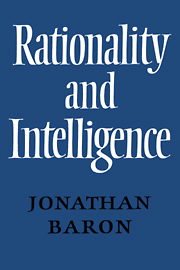Book contents
- Frontmatter
- Contents
- Preface
- 1 Introduction
- 2 Rational choices and plans
- 3 A theory of thinking
- 4 The scheme fleshed out: a decision–theoretic analysis of thinking
- 5 Conditions of effective thinking
- 6 Effects of rational thinking on the individual and society
- 7 The teaching of rational thinking
- References
- Index
1 - Introduction
Published online by Cambridge University Press: 05 October 2009
- Frontmatter
- Contents
- Preface
- 1 Introduction
- 2 Rational choices and plans
- 3 A theory of thinking
- 4 The scheme fleshed out: a decision–theoretic analysis of thinking
- 5 Conditions of effective thinking
- 6 Effects of rational thinking on the individual and society
- 7 The teaching of rational thinking
- References
- Index
Summary
The main point of this book is that intelligent thinking is, among other things, rationally conducted. When we think intelligently, we do not hesitate to think about something when thinking can do some good. We consider possible conclusions — and possible goals for our thinking — other than the first one to enter our minds, and we are responsive to evidence, even when it goes against a possibility that we favor initially. When we seek evidence, we do not simply look for evidence that confirms our most favored possibility. We do not draw hasty and ill-considered conclusions, nor do we ruminate on irrelevancies.
When I speak of intelligence, I do not refer to just those qualities that make for high scores on IQ tests, or those that make for expertise in a particular field. Intelligent thinking can be effective in solving problems and making choices, even when pencil and paper must be substituted for a powerful memory or when the expertise of others must be relied upon instead of one's own. For example, we generally expect good administrators to think well in their work. Suppose you had to specify the intellectual traits of the president of the United States, or of whatever social unit you care most about, but without being able to specify his or her particular beliefs or knowledge.
- Type
- Chapter
- Information
- Rationality and Intelligence , pp. 1 - 49Publisher: Cambridge University PressPrint publication year: 1985



